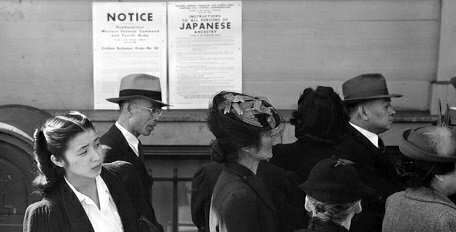Several politicians recently referred to a controversial World War II Supreme Court decision in the debate about Syrian refugees. Public reaction showed how much the Korematsu decision is debated – and derided – today.
 Most prominently, Roanoke, Virginia Mayor David Bowers said, “I’m reminded that Franklin D. Roosevelt felt compelled to sequester Japanese foreign nationals after the bombing of Pearl Harbor, and it appears that the threat of harm to America from ISIS now is just as real and serious as that from our enemies then.”
Most prominently, Roanoke, Virginia Mayor David Bowers said, “I’m reminded that Franklin D. Roosevelt felt compelled to sequester Japanese foreign nationals after the bombing of Pearl Harbor, and it appears that the threat of harm to America from ISIS now is just as real and serious as that from our enemies then.”
Quite quickly, Bowers apologized to the Japanese-American community for his comments after a flood of negative commentaries and editorials hit the national media.
“In particular, I apologize to Americans of Japanese descent for the unwise and inappropriate comparison between the internment of Japanese Americans during World War II and the current refugee crisis. Any such comparison was a mistake and I apologize. It's not in my heart to be racist or bigoted,” Bowers said.
The Korematsu decision remains a lightning rod for controversy. On December 18, 1944, a divided Supreme Court allowed the federal government to detain people based on their race during a wartime situation.
In early 1942, President Roosevelt issued Presidential Executive Order 9066, after fears generated by the Japanese attack on Pearl Harbor made the safety of America's West Coast a priority. The order started a process that gave the military power to exclude citizens of Japanese ancestry from regions called “military areas.”
Under another provision, called Exclusion Order No. 34, a Japanese-American citizen named Fred Toyosaburo Korematsu was arrested for going into hiding in Northern California after refusing to go to an internment camp. There were 10 camps set up nationally, and about 120,000 people were interned in the camps during the war. About two-thirds of them were Japanese-Americans who were born in the United States.
The Korematsu v. U.S. decision ruled on the ability of the military, in times of war, to exclude and intern minority groups. (The court had heard a similar case in 1943, Hirabayashi v. United States, and decided that Gordon Hirabayashi, a college student, was guilty of violating a curfew order.)
The court ruled by a 6 to 3 vote that the government had the power to arrest and intern Fred Korematsu. Justice Hugo Black, writing for the majority, included a paragraph that is still debated today: “It should be noted, to begin with, that all legal restrictions which curtail the civil rights of a single racial group are immediately suspect. That is not to say that all such restrictions are unconstitutional. It is to say that courts must subject them to the most rigid scrutiny. Pressing public necessity may sometimes justify the existence of such restrictions; racial antagonism never can,” Black said.
The three dissenting Justices said Korematsu’s constitutional rights had been clearly violated.
“Such exclusion goes over ‘the very brink of constitutional power,’ and falls into the ugly abyss of racism,” said Justice Frank Murphy. “The broad provisions of the Bill of Rights... are [not] suspended by the mere existence of a state of war. Distinctions based on color and ancestry are utterly inconsistent with our traditions and ideals.”
Current Justice Antonin Scalia cites Justice Robert Jackson’s dissent as his favorite Supreme Court opinion of all time. Scalia said he admired Jackson’s opinion for its writing style and for the fact that “it was nice to know that at least somebody on the court realized that that was wrong.”
“Now, if any fundamental assumption underlies our system, it is that guilt is personal and not inheritable,” Jackson wrote back in 1944. “But here is an attempt to make an otherwise innocent act a crime merely because this prisoner is the son of parents as to whom he had no choice, and belongs to a race from which there is no way to resign. If Congress, in peacetime legislation, should enact such a criminal law, I should suppose this Court would refuse to enforce it.”
Although in 1983, federal courts overturned Korematsu’s original convictions, the Supreme Court has never overturned the decision from 1944, which is a controversy in itself. (On the public record, several sitting Justices have said the Korematsu decision was wrongly decided.)
Justice Scalia, speaking at an event in Hawaii in 2014, said Americans shouldn’t assume that another Korematsu situation couldn’t occur in a wartime situation.
“You are kidding yourself if you think the same thing will not happen again,” Scalia said, citing a Latin phrase meaning, “in times of war, the laws fall silent.”
“That’s what happens. It was wrong, but I would not be surprised to see it happen again—in time of war. It’s no justification but it is the reality,” Scalia said.






